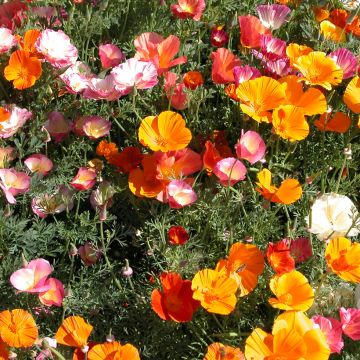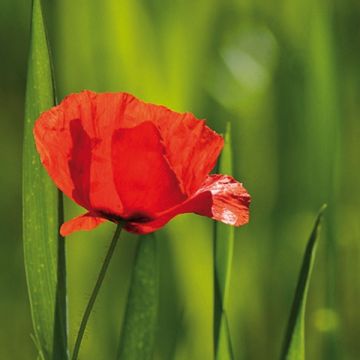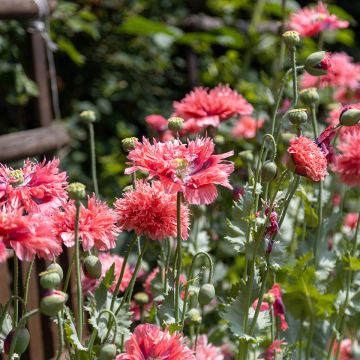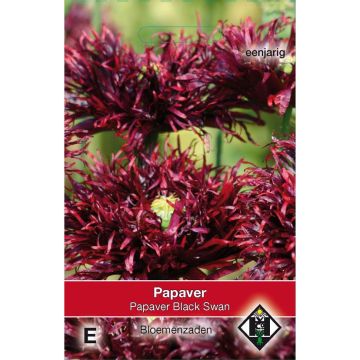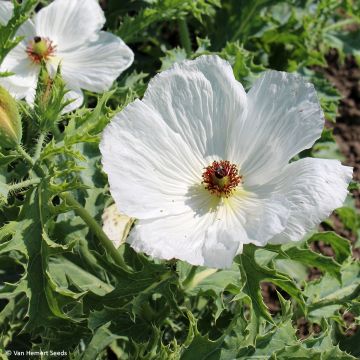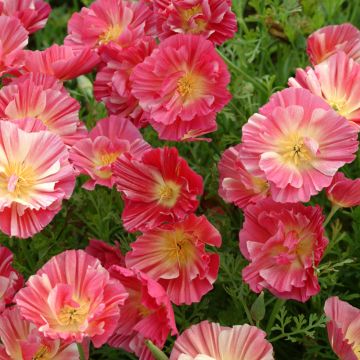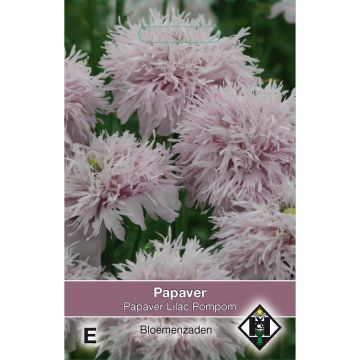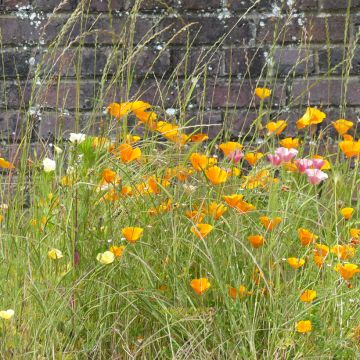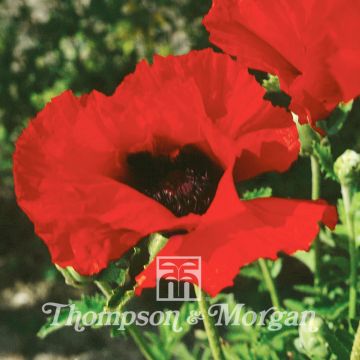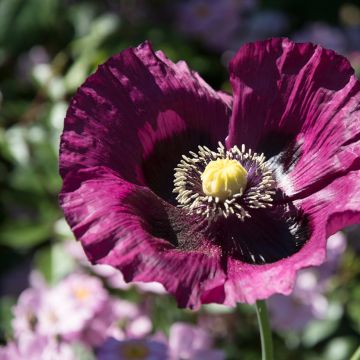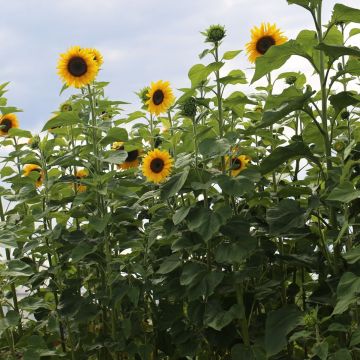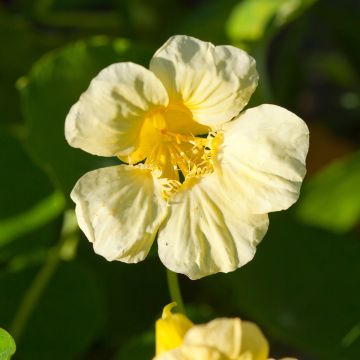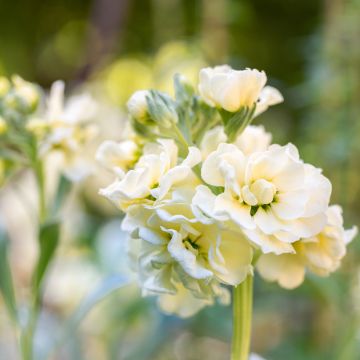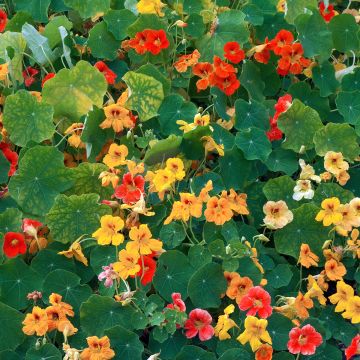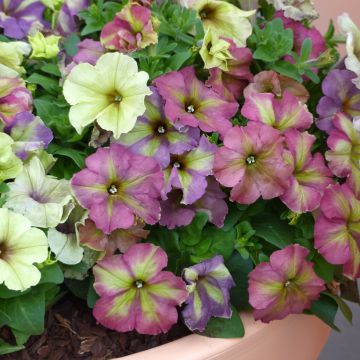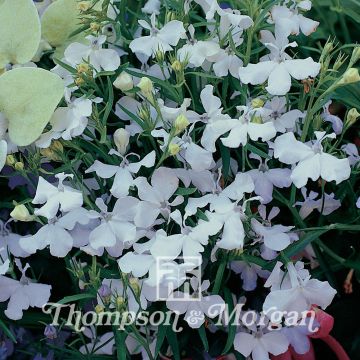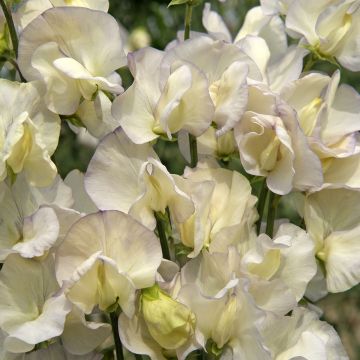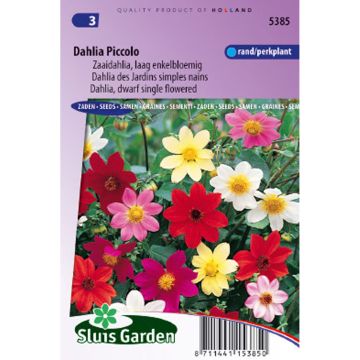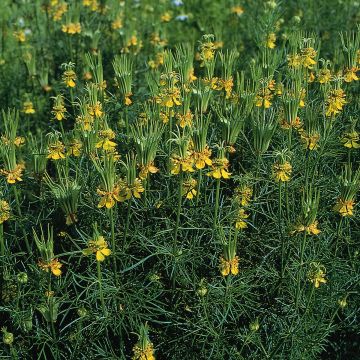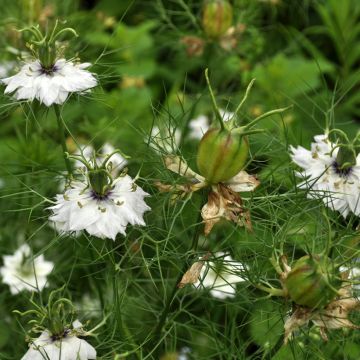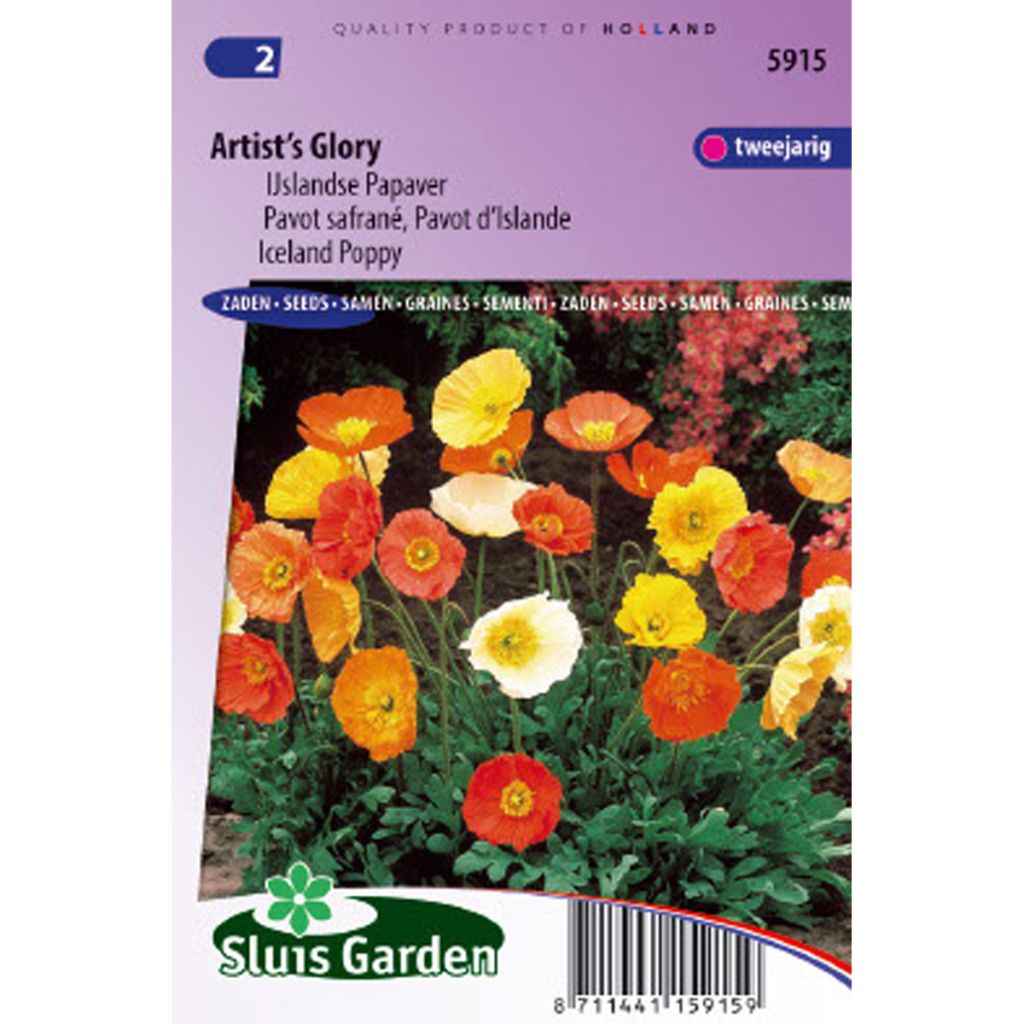

Islandic Poppy Artist’s Glory Seeds - Papaver nudicaule
Islandic Poppy Artist’s Glory Seeds - Papaver nudicaule
Papaver nudicaule Artist’s Glory
Iceland Poppy, Arctic Poppy
This item cannot be shipped to the selected country
Dispatch by letter from €3.90
More information
Schedule delivery date,
and select date in basket
This plant carries a 6 months recovery warranty
More information
We guarantee the quality of our plants for a full growing cycle, and will replace at our expense any plant that fails to recover under normal climatic and planting conditions.
Seed-only orders are dispatched by sealed envelope. The delivery charge for seed-only orders is €3.90.
Does this plant fit my garden?
Set up your Plantfit profile →
Description
This mix of Icelandic poppies also called Papaver nudicaule Artist's Glory, produces large, single, fragrant, wrinkled flowers in shades of white, yellow, orange or pastel pink that are borne on long, silky stems above light green foliage. These medium-sized plants are ideal for rockeries, pots and cut flowers. Very hardy, this perennial is cultivated as a biennial and flowers in summer. Sowed directly outside, or transplanted when very small, this poppy will not disappoint. It likes cool summers and locations without scorching sunlight and can content itself with mediocre soil.
Papaver nudicaule, also known as Icelandic Poppy, is a low-growing perennial plant of the Papaveraceae family. It is native to the regions of North America and Asia Minor that benefit from cool summers. Its root system is organized around a taproot that grows deep in the soil. Its leaves are arranged in basal rosettes that swell over time, spreading over a maximum width of 20 cm. The elongated leaves are more or less serrated. They are bluish-green and covered with long hairs. The 'Artist's Glory' variety shows a particularly graceful habit, growing in clumps that reach 45 cm high when its crown of vivid, airy flowers appears. Flowering takes place between May and August, depending on the date of sowing. The flower stems are initially swan-necked and then straighten out as the buds burst in bloom. The poppy flowers which are large in proportion to the size of the plant, last for about a week. They come in a variety of colours and attract many pollinating insects. They are followed by elongated fruits which once mature, open on their upper half, releasing many small round seeds into the wind.
Icelandic poppies like cool summers and manage to grow in most barren lands. They enchant flowerbeds where they form soft, bright patches of colour. The 'Artist's Glory' mix is an excellent choice for beds where it brings the charm of the countryside into the garden. Sow them directly in the more informal areas, in the rock garden or in a gravel garden. It will look sublime in the company of ornamental grasses such as Stipa tenuifolia or Mulhenbergia capillaris, catnips, with white Love-in-a-mists, tulips and forget-me-nots. It is also an excellent cut flower.
Report an error about the product description
Flowering
Foliage
Plant habit
Botanical data
Papaver
nudicaule
Artist’s Glory
Papaveraceae
Iceland Poppy, Arctic Poppy
Cultivar or hybrid
Other Poppy seeds
Planting and care
Although it is grown as an evergreen perennial in Nordic countries, the Icelandic poppy is considered more of a short-lived annual or perennial in places where summers are hot and dry. It prefers cool summers which guarantee a certain amount of atmospheric humidity. It prefers a drained soil that keeps some freshness deeper underground. This plant adapts to poor soil where it stays small but becomes more formidable in size in fertile soils. In regions with dry summers, positions in partial shade will be more favourable to its growth. Elsewhere, it requires full sun. Its taproot must be able to penetrate deep into the soil. For this reason, this plant should be sown directly outside in its final location or transplanted as a young plant. In these ideal growing conditions, it can truly be perennial and flower consistently for several years in a row. It does not like to be transplanted, let alone divided. Sow the fresh Icelandic Poppy seeds in January-February or August-September. Sow directly in weedless, fine, well loosened soil, either in a pot or tray placed in a cold frame. Scatter the seeds on the surface of fine, well-drained soil which should be kept moist. Do not cover the seeds. Maintain a temperature of 18-20°C. Place the tray or pots in a mini-greenhouse or under a transparent plastic cover until germination which takes 18-21 days. Light facilitates germination. Transplant the seedlings into pots of 8 cm diameter when they are large enough to be handled. Place them in cooler conditions for 10 to 15 days to acclimatize them gradually and transplant them into their final outdoor location, after the last frosts. Space the plants 15 cm apart. You can also sow in an unheated greenhouse or conservatory in late summer or early autumn which usually results in more vigorous plants. Place the plants in a well lit spot and water sparingly. Plant out the plants in the garden the following spring.
Sowing period
Intended location
-
, onOrder confirmed
Reply from on Promesse de fleurs
Flower seeds
Haven't found what you were looking for?
Hardiness is the lowest winter temperature a plant can endure without suffering serious damage or even dying. However, hardiness is affected by location (a sheltered area, such as a patio), protection (winter cover) and soil type (hardiness is improved by well-drained soil).

Photo Sharing Terms & Conditions
In order to encourage gardeners to interact and share their experiences, Promesse de fleurs offers various media enabling content to be uploaded onto its Site - in particular via the ‘Photo sharing’ module.
The User agrees to refrain from:
- Posting any content that is illegal, prejudicial, insulting, racist, inciteful to hatred, revisionist, contrary to public decency, that infringes on privacy or on the privacy rights of third parties, in particular the publicity rights of persons and goods, intellectual property rights, or the right to privacy.
- Submitting content on behalf of a third party;
- Impersonate the identity of a third party and/or publish any personal information about a third party;
In general, the User undertakes to refrain from any unethical behaviour.
All Content (in particular text, comments, files, images, photos, videos, creative works, etc.), which may be subject to property or intellectual property rights, image or other private rights, shall remain the property of the User, subject to the limited rights granted by the terms of the licence granted by Promesse de fleurs as stated below. Users are at liberty to publish or not to publish such Content on the Site, notably via the ‘Photo Sharing’ facility, and accept that this Content shall be made public and freely accessible, notably on the Internet.
Users further acknowledge, undertake to have ,and guarantee that they hold all necessary rights and permissions to publish such material on the Site, in particular with regard to the legislation in force pertaining to any privacy, property, intellectual property, image, or contractual rights, or rights of any other nature. By publishing such Content on the Site, Users acknowledge accepting full liability as publishers of the Content within the meaning of the law, and grant Promesse de fleurs, free of charge, an inclusive, worldwide licence for the said Content for the entire duration of its publication, including all reproduction, representation, up/downloading, displaying, performing, transmission, and storage rights.
Users also grant permission for their name to be linked to the Content and accept that this link may not always be made available.
By engaging in posting material, Users consent to their Content becoming automatically accessible on the Internet, in particular on other sites and/or blogs and/or web pages of the Promesse de fleurs site, including in particular social pages and the Promesse de fleurs catalogue.
Users may secure the removal of entrusted content free of charge by issuing a simple request via our contact form.
The flowering period indicated on our website applies to countries and regions located in USDA zone 8 (France, the United Kingdom, Ireland, the Netherlands, etc.)
It will vary according to where you live:
- In zones 9 to 10 (Italy, Spain, Greece, etc.), flowering will occur about 2 to 4 weeks earlier.
- In zones 6 to 7 (Germany, Poland, Slovenia, and lower mountainous regions), flowering will be delayed by 2 to 3 weeks.
- In zone 5 (Central Europe, Scandinavia), blooming will be delayed by 3 to 5 weeks.
In temperate climates, pruning of spring-flowering shrubs (forsythia, spireas, etc.) should be done just after flowering.
Pruning of summer-flowering shrubs (Indian Lilac, Perovskia, etc.) can be done in winter or spring.
In cold regions as well as with frost-sensitive plants, avoid pruning too early when severe frosts may still occur.
The planting period indicated on our website applies to countries and regions located in USDA zone 8 (France, United Kingdom, Ireland, Netherlands).
It will vary according to where you live:
- In Mediterranean zones (Marseille, Madrid, Milan, etc.), autumn and winter are the best planting periods.
- In continental zones (Strasbourg, Munich, Vienna, etc.), delay planting by 2 to 3 weeks in spring and bring it forward by 2 to 4 weeks in autumn.
- In mountainous regions (the Alps, Pyrenees, Carpathians, etc.), it is best to plant in late spring (May-June) or late summer (August-September).
The harvesting period indicated on our website applies to countries and regions in USDA zone 8 (France, England, Ireland, the Netherlands).
In colder areas (Scandinavia, Poland, Austria...) fruit and vegetable harvests are likely to be delayed by 3-4 weeks.
In warmer areas (Italy, Spain, Greece, etc.), harvesting will probably take place earlier, depending on weather conditions.
The sowing periods indicated on our website apply to countries and regions within USDA Zone 8 (France, UK, Ireland, Netherlands).
In colder areas (Scandinavia, Poland, Austria...), delay any outdoor sowing by 3-4 weeks, or sow under glass.
In warmer climes (Italy, Spain, Greece, etc.), bring outdoor sowing forward by a few weeks.

































